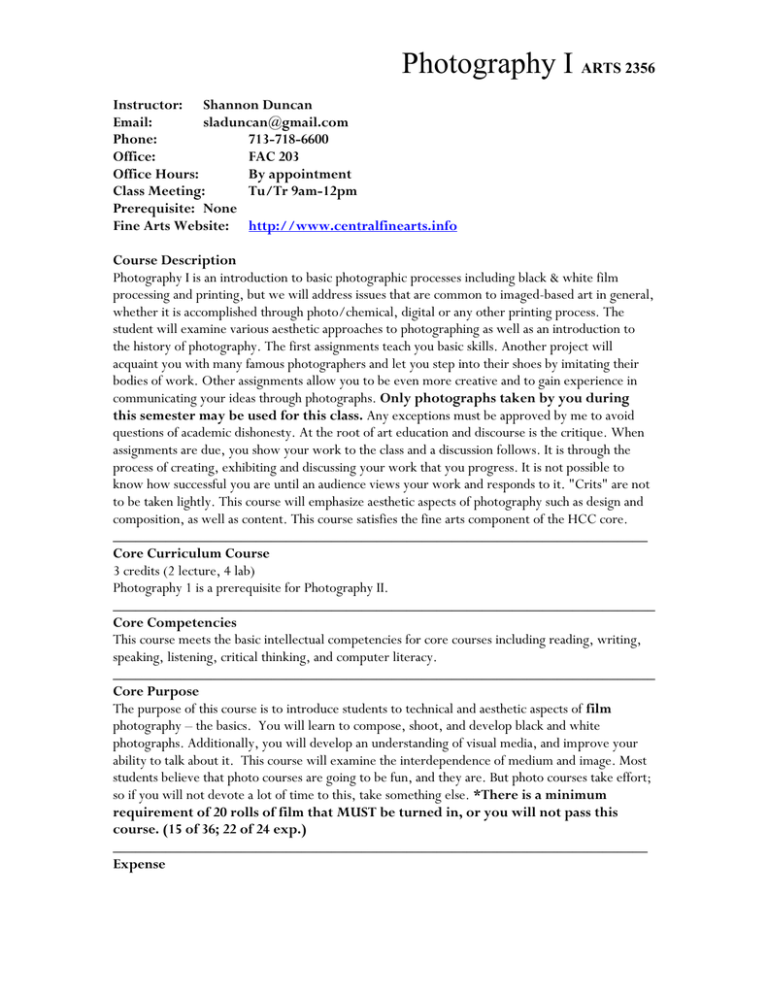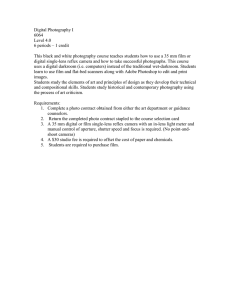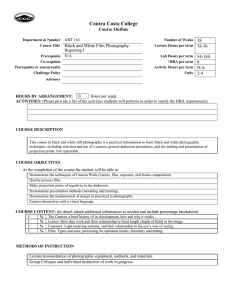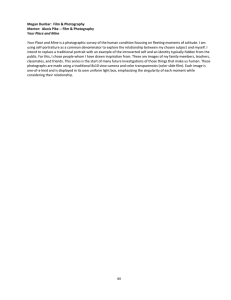ARTS2356_0004_Duncan.doc
advertisement

Photography I ARTS 2356 Instructor: Shannon Duncan Email: sladuncan@gmail.com Phone: 713-718-6600 Office: FAC 203 Office Hours: By appointment Class Meeting: Tu/Tr 9am-12pm Prerequisite: None Fine Arts Website: http://www.centralfinearts.info Course Description Photography I is an introduction to basic photographic processes including black & white film processing and printing, but we will address issues that are common to imaged-based art in general, whether it is accomplished through photo/chemical, digital or any other printing process. The student will examine various aesthetic approaches to photographing as well as an introduction to the history of photography. The first assignments teach you basic skills. Another project will acquaint you with many famous photographers and let you step into their shoes by imitating their bodies of work. Other assignments allow you to be even more creative and to gain experience in communicating your ideas through photographs. Only photographs taken by you during this semester may be used for this class. Any exceptions must be approved by me to avoid questions of academic dishonesty. At the root of art education and discourse is the critique. When assignments are due, you show your work to the class and a discussion follows. It is through the process of creating, exhibiting and discussing your work that you progress. It is not possible to know how successful you are until an audience views your work and responds to it. "Crits" are not to be taken lightly. This course will emphasize aesthetic aspects of photography such as design and composition, as well as content. This course satisfies the fine arts component of the HCC core. _______________________________________________________________________ Core Curriculum Course 3 credits (2 lecture, 4 lab) Photography 1 is a prerequisite for Photography II. ________________________________________________________________________ Core Competencies This course meets the basic intellectual competencies for core courses including reading, writing, speaking, listening, critical thinking, and computer literacy. ________________________________________________________________________ Core Purpose The purpose of this course is to introduce students to technical and aesthetic aspects of film photography – the basics. You will learn to compose, shoot, and develop black and white photographs. Additionally, you will develop an understanding of visual media, and improve your ability to talk about it. This course will examine the interdependence of medium and image. Most students believe that photo courses are going to be fun, and they are. But photo courses take effort; so if you will not devote a lot of time to this, take something else. *There is a minimum requirement of 20 rolls of film that MUST be turned in, or you will not pass this course. (15 of 36; 22 of 24 exp.) _______________________________________________________________________ Expense Photography I ARTS 2356 It is required that you have a working camera that can be operated manually. You will incur $200 to $300 in other expenses (aside from the cost of the camera - $200) during the semester, so plan accordingly. Financial problems are not acceptable excuses for not getting coursework done on time. If you have problems in this regard, talk to me before the worst happens — maybe we can figure out a solution. ________________________________________________________________________ ADA Statement Any student with a documented disability (e.g. physical, learning, psychiatric, vision, learning, etc.) who needs to arrange reasonable accommodations must contact the Disability Services Office at the respective college at the beginning of each semester. Faculty is authorized to provide only the accommodations requested by the Disability Support Services Office. For questions, contact Donna Price at 713-718-5165 or the Disability Counselor at each college. Also visit the ADA website at http://www.hccs.edu/students/disability/index.htm. ________________________________________________________________________ Children/Guests in Classroom There are no children/guests allowed in the classroom/lab at any time under any circumstances. If this is a foreseeable issue, understand that your attendance can be affected if other arrangements cannot be made. ________________________________________________________________________ The Lab/Classroom Friends and pets are not allowed in the lab areas. No smoking. No food or drinks beyond “the line.” Throw away trash and leave everything straight and clean. This is your lab and there is no one to clean up after you. Please take this responsibility seriously. If you don't, you will not be allowed to use the lab. Photographic equipment is fragile -- never use force with cameras, enlargers, etc. Everything should work smoothly and easily – if it doesn’t, ask for help. If anything is broken or needs attention, notify me, a lab monitor, or a photo instructor immediately. ________________________________________________________________________ Academic Honesty Statement The HCCS policy on scholastic dishonesty includes, but is not limited to cheating on a test, plagiarism, and collusion: 1. Cheating on a test includes: * Copying from another student's test paper; using during a test, materials not authorized by the person giving the test; * Collaborating with another student during a test without authority; * Knowingly using, buying, selling, stealing, transporting, or soliciting in whole or part the contents of an unadministered test; * Bribing another person to obtain a test that is to be administered. 2. Plagiarism means the appropriation of another's work and the unacknowledged incorporation of that work in one's own written work offered for credit. 3. Collusion means the unauthorized collaboration with another person in preparing written work offered for credit. Possible punishments for academic dishonesty may include a grade of 0 or F on the particular assignment, failure in the course, and/or recommendation for probation or dismissal from the College. Photography I ARTS 2356 _______________________________________________________________________ Attendance Policy Students are expected to attend classes regularly. Students are responsible for course content covered during their absences, and it is the student's responsibility to consult with instructors for make-up assignments. Class attendance is checked daily. It is the responsibility of the student to drop a course for non-attendance. Failure to do so could result in the grade earned. Additionally, the instructor has the authority to drop a student for excessive absences. A student may be dropped from a course for absenteeism after the student has accumulated absences in excess of 12.5 percent of the hours of instruction. Please be aware of the deadline for administrative or student initiated withdrawals. After that date students will receive the grade that they earned. ________________________________________________________________________ Absences: Attendance is a basic requirement and will be checked daily. If you miss class for other than documented health reasons, it will lower your class participation. If you miss more than three classes, your participation grade will be lowered each subsequent time. ________________________________________________________________________ Critique/Late Work: Attendance at critique is essential – for you as well as your peers. Don't miss, even if you have not finished your own project. An unexcused absence from a critique will lower your grade on that assignment by a full letter, in addition to affecting your participation grade. ________________________________________________________________________ Tardiness: Come to class on time; when you are late, you disrupt lectures and demos and distract fellow students. If you come late twice, that will count as an absence. Make-Up: There will be no make-up classroom lectures, demonstrations and or discussions. Information covered in class will not be repeated for tardy or absent students. Find a partner to call in case you miss class and ask to use their notes. ________________________________________________________________________ Grading Policy A (90-100/Excellent) 4 points per semester hour B (80-89/Good) 3 points per semester hour C (70-79/Fair) 2 points per semester hour D (6-69/Passing) 1 point per semester hour F (Failing) 0 points per semester hour W (Withdrawn) 0 points per semester hour I (Incomplete) 0 points per semester hour Your final grade will be based on photo assignments, film requirement, journal entries, final portfolio, class participation & class attendance. Come to class on time, do the required assignments on time, attend and participate in critiques and you will most likely make no less than a “B.” As in most art courses, in order to earn an “A,” you must create interesting and superior work that is well thought out and executed, as well as being an active participant in the critique. Five (5) Assignments, due at time of Critique Journal Entries (20 minimum), due at Critique Final Portfolio Presentation Artist Presentation & Paper 500 100 100 100 Photography I ARTS 2356 540 Negatives Participation/Clean Up 100 100 1000 points ________________________________________________________________________ Assignments Assignments are due at the beginning of class on the due date & will be accounted for with attendance. Plan to complete them a few days before a critique, as they may need alteration. Visual art projects, like writing projects, almost always need more work and polish beyond the "first edit," and therefore always take longer than originally planned. Don't come to class empty-handed because you waited until the last minute and "something happened" (like the chemicals were bad, the water was off, there were no enlargers available, etc.). "Something" frequently does happen and your planning must take this into account. Turning in a project late lowers your grade on that assignment by a full letter for each class day it is overdue. ________________________________________________________________________ The “I” Policy There will be no Incompletes given in this course. If you feel you will not be able to complete your work before final portfolios are due, be sure to review the HCCS drop procedures before the DROP (W) deadline passes. ________________________________________________________________________ Drop/Withdrawal Policy Withdrawals Be certain you understand HCCS policies about dropping a course. It is your responsibility to officially withdraw from a class. When considering withdrawal from a course, remember that: 1. No grade is given and your transcript reflects no record of the course if you withdraw before the Official Date of Record. 2. A “W” (indicating withdrawal) appears on your transcript if you drop a course after the Official Date of Record and before the final deadline. 3. The final deadline to drop a course is approximately four weeks before fall or spring semester finals and one week before summer semester exams. Look on the semester calendar for the specific date. After this date students will receive the grade they earned. 4. A “W” could have a detrimental effect on financial aid, scholarships, or visas. It is the responsibility of each student to understand the consequences. Read carefully and understand that W grades are potentially damaging for many studentʼs academic ad personal lives. Please be aware that withdrawals grade (W) may result in loss of your health insurance coverage, loss of your academic or other types of scholarships, and/or loss of your student visa status. CAUTION: ATTEND CLASS to maintain a grade! You must withdraw yourself to (receive grade W) Do not rely on your instructor to drop you. Last Day for Administrative/Student Withdrawals is Thursday, November 18, 2010 by 4:30 p.m. Required Reading/Textbook Read and understand the entire syllabus and its contents. You are responsible for its Photography I ARTS 2356 contents. You must have a copy of your camera’s manual, of which you also know the contents. Handouts will be given to you periodically please keep them in a binder so that you may refer to them in the future. Textbooks None required Work outside of class Students are expected to work on their projects or journals outside of class in order to satisfactorily complete the assignments. It may be unrealistic to expect all of the work necessary to complete the project can be done only in the time allotted for the class to meet. Open studios The beginning of open studio hours will be announced in class. Once lab hours begin, each student can access the darkroom between _______________ on Monday and Wednesday, and from _________________ on Thursdays. You must have an access card and sign in to use the lab. You must also start the final wash 45 minutes before lab ends. If these policies are broken, lab hours will be revoked. Insurance disclaimer The Fine Arts Department at Central College strongly recommends that all HCCS students carry some form of medical insurance to cover illness and injury, both on and off campus. Information regarding low-cost health insurance for students is available in the Fine Arts office. Under Texas state statute, HCCS is immune to liability in the event of accident or injury. ARTS academic advising statement Academic advisement concerning specific Fine Arts courses and degree plans for Art is available to Central College students during the academic semesters. Please sign up in the Fine Arts office, FAC 101, to speak to a full time instructor in your area of interest. Tutoring Students are encouraged to take advantage of tutoring services offered by the English Department located on the third floor of the Fine Arts Center next to the English office. Tutors will assist writing assignments and are especially helpful for students when English is a second language. In addition, online tutoring is available 24/7 at www.askonline.net. Submissions are returned within 24 hours or less. Repetition of courses Students who repeat a course for a third or more time may face significant tuition and/or fee increases at HCC and other Texas public colleges and universities. Please ask your instructor or counselor about opportunities for tutoring and other assistance prior to considering course withdrawal or if you are not receiving passing grades. Supply List +++Paper: Begin with a 100-sheet box of resign coated (rc) paper. *Be careful when buying film or paper -- you cannot return it. Don't open photo paper except under a safelight. Camera: 35mm camera, either an all-manual model, or one which has the option of full manual operation. There are no exceptions to this requirement. If your camera does not have a built in light meter, you must have a hand-held light meter. You need a lens between 28mm and 50mm. If Photography I ARTS 2356 you buy a used camera and it doesn’t come with a manual, try www.cameraorphans.com, www.manualsrus.com or www.craigcamera.com. Your camera’s manual is a requirement. Film: Begin with ten 36-exposure rolls of Kodak T-Max (ASA 400), Kodak Tri-X (ASA 400) or Ilford HP-5 (ASA 400). Themometer: A must-have. Canned Air: Another must-have. Film Developing Tank: Paterson plastic tank and an extra reel. Filters: Ilford Multigrade Filters in the 6"x 6" box. Sleeves: Package of 25 Print File negative sleeves for 35mm film (holds 7 rows of 5 exposures). Some sleeves will hold corresponding contact sheets. Gray Card: Kodak 18% gray card. Envelope: 10” x 13” clasp envelope for turning in assignments. Optional: tripod, flash, b&w filters, lens cleaning solution/lens tissues, cable release. Suggested: 11” x 14” piece of mat board. Inexpensive 4x loupe. White or orange grease pencil. 3-ring binder or dust free "binder case." Apron (chemicals ruin clothes). Scissors. Spotting: One spotting brush and a bottle of #3 Spotone retouching dye (or a set of spotting pens) Notes on Buying Supplies Local Dealers: Camera Co-op* 801 Durham Drive 713-522-7837 * Camera Co-op offers student discounts, so take your ID. Mail Order: Companies include Freestyle (800-292-6137), Calumet (800-225-8638), Abbey Camera (800-252-2239), Unique Photo (www.uniquephoto.com) and B&H Photo (800-947-6628; www.bhphotovideo.com). You don't have to pay tax, but do pay shipping. Ask the following: Is the item in stock and available to be shipped? When will it be shipped and when will it arrive? What is my order number? Repair: Camera Care Center, 2113 Richmond Avenue, Houston, TX 77098-3326 (713) 521-1441 SCHEDULE (subject to change) 1/18, Tu ORIENTATION + SUPPLIES HW: Bring RC paper, journal and objects 1/20, Tr DARKROOM INTRODUCTION & POLICIES PHOTOGRAM DEMO, ASSIGNMENT #1 - PHOTOGRAMS Photography I ARTS 2356 **Journal Entries 1 & 2 due 1/25 HW: Bring RC paper, sketches and journal entries and objects 1/25, Tu IN-CLASS WORKDAY HW: Bring RC paper, sketches and journal entries and objects 1/27, Tr CRITICIZING PHOTOGRAPHS/IN-CLASS WORKDAY *Journal Entry 3 due 2/1 HW: CRITIQUE #1, PHOTOGRAMS – 9:15 AM Bring Camera + 1 Roll of Black and White Film (not CN based film!!!) 35mm SLR with manual functions; TMax 400, Tri-X 400, or Ilford Delta 400 2/1, Tu CRITIQUE #1, PHOTOGRAMS – 9:15 AM CAMERA CHECK, FILM LOADING DEMO HW: Bring journal and camera with film already loaded 2/3, Tr EXPOSURE LECTURE, ASSIGNMENT #2 – EXPOSURE (3 rolls) IN-CLASS TEST ROLL (1st roll) HW: Finish shooting test roll of film. Bring camera with film inside, film processing tank and extra reel 2/8, Tu PROCESSING FILM DEMO HW: Shoot 2 rolls of film – aperture priority & shutter priority 2/10, Tr CONTACT SHEET DEMO/PROCESS NEW FILM *Journal Entry 4 due 2/15 HW: Finish shooting & processing 2 new rolls of film – aperture priority & shutter priority. 2/15, Tu ENLARGING NEGATIVES DEMO/IN-CLASS WORKDAY HW: Turn in contact sheets 2/17. Critique #2, 2/24.



